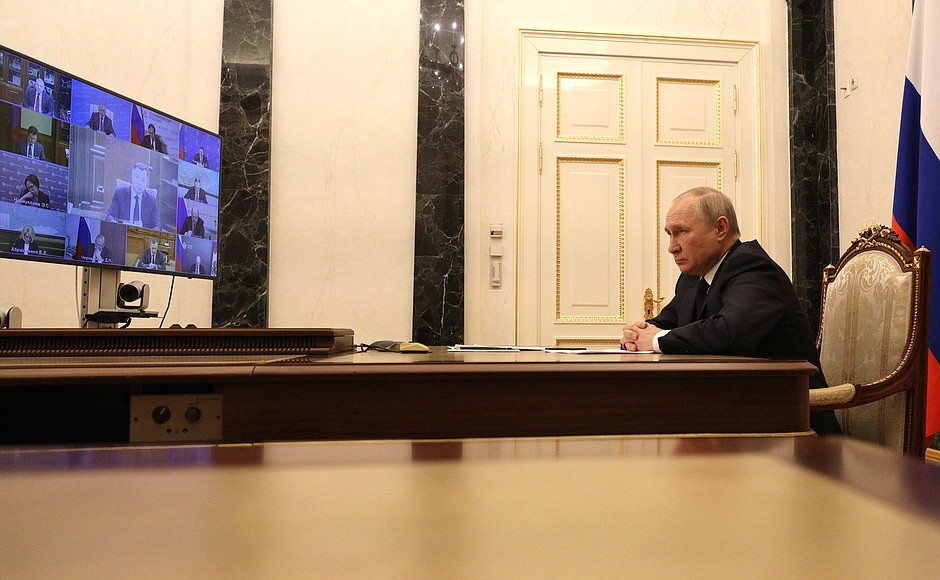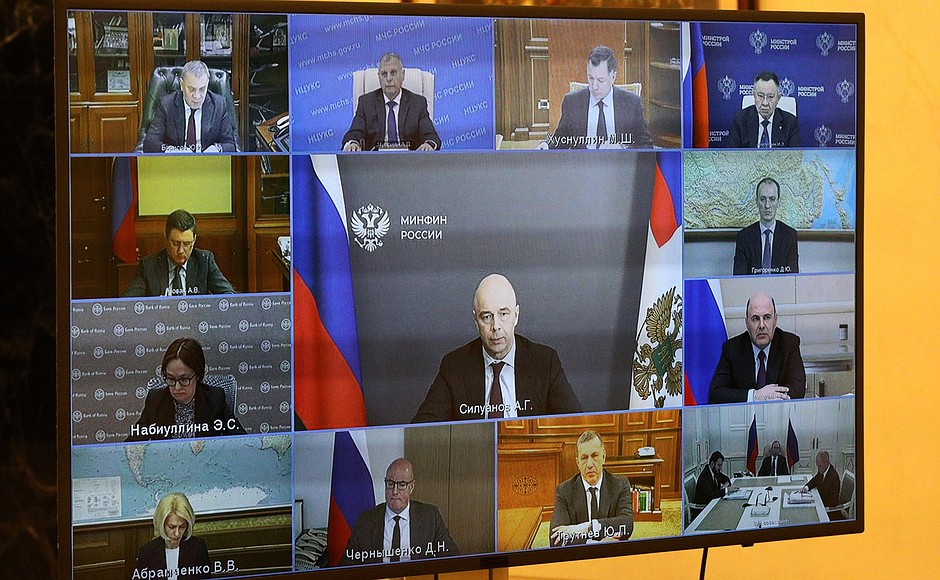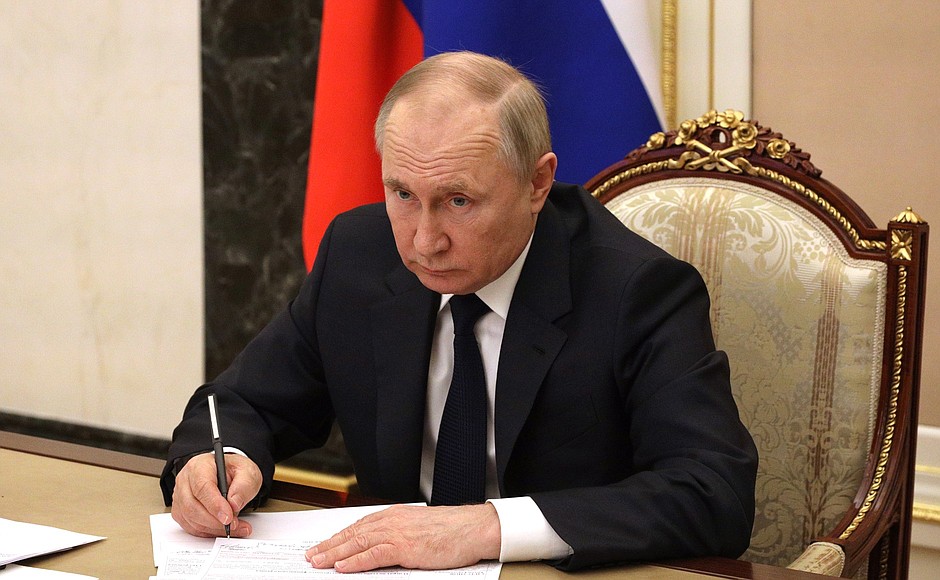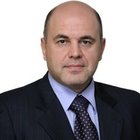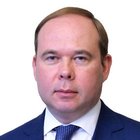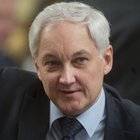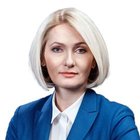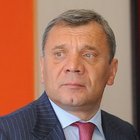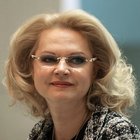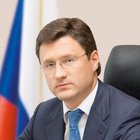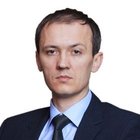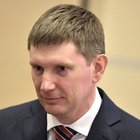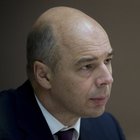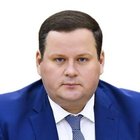The meeting was attended by Prime Minister Mikhail Mishustin, Chief of Staff of the Presidential Executive Office Anton Vaino, First Deputy Prime Minister Andrei Belousov, First Deputy Chief of Staff of the Presidential Executive Office Sergei Kiriyenko, deputy prime ministers Viktoria Abramchenko, Yury Borisov, Tatyana Golikova, Alexander Novak, Marat Khusnullin, Dmitry Chernyshenko, Deputy Prime Minister – Chief of the Government Staff Dmitry Grigorenko, Deputy Prime Minister – Presidential Plenipotentiary Envoy to the Far Eastern Federal District Yury Trutnev, Presidential Aide Maxim Oreshkin, Economic Development Minister Maxim Reshetnikov and Finance Minister Anton Siluanov. The heads of a number of ministries, the Accounts Chamber and the Central Bank were also invited to attend.
* * *
President of Russia Vladimir Putin: Good afternoon, colleagues,
Today, we will discuss a set of measures to minimise the consequences of sanctions on the Russian economy and the people of our country.
We communicate on these issues almost every day. I just discussed a number of them with the Prime Minister.
Let’s get to work. I would like Mr Mishustin to start the discussion.
Please go ahead, Mr Mishustin.
Prime Minister Mikhail Mishustin: Mr President, colleagues,
Mr President, under your instructions, the Government is working to increase the stability of the economy amid the unprecedented increase in external pressure.
A special headquarters has been formed, which coordinates the activities of all departments, including at the regional level. We are monitoring the situation practically 24 hours a day, 7 days a week with the assistance from business leaders and expert community associations. Steps to protect the most vulnerable areas are being worked through sector by sector so that all aspects of operations in specific sectors and enterprises are taken into account as fully as possible when preparing decisions.
Our core goals include protecting the domestic market and ensuring uninterrupted functioning of enterprises by eliminating disruptions in logistics and production chains and, of course, maintaining employment. It is important to help the people and businesses quickly adapt to the changing circumstances.
Two sets of draft laws with anti-sanction measures as the top priority, that’s about 20 draft laws in all, and the Government acts that are necessary to implement them, have been promptly prepared. They include specific proposals for stabilising financial markets, supporting a number of industries, ensuring sustainability of the domestic private sector, and also proposals for the return of capital to Russia’s jurisdiction.
A draft law to prevent manufacturing shutdowns has been prepared. If foreign owners shut down their facilities without reasonable grounds, the Government is proposing the introduction of external management. Depending on the owner’s decision, this will determine the future of the company. In the process, the key goal will be to maintain profile corporate activities and jobs. Most companies are announcing temporary suspension of operations while preserving jobs and salaries. We will carefully monitor this situation.
As for industry-specific decisions, we have prepared a package of measures to help the IT industry on your approval, Mr President. Thus, all relevant companies will be relieved of profit tax liability and inspections by regulatory bodies. Of course, we will continue creating conditions to attract specialists into this sector of the economy.
We have proposals on supporting the construction industry as well. We will simplify the drafting of urban development plans and the procedure for holding public hearings on them, as well as registration of rights to facilities already built. We will expedite the allocation of land plots and extend existing lease contracts if necessary. This will allow the industry to maintain a consistent pace.
Regarding the interests of transport companies, we will assist airlines in maintaining their fleets of foreign aircraft. We will introduce restrictions on countries that ban our ships from entering their ports. We will try to level out the influence of international companies on the operations of Russian railway transport.
The tourist industry will also receive preferences. We will suspend the VAT for companies that build and lease tourist facilities or that subcontract operations to other companies. This will be valid for five years after hotels or other accommodation facilities are put into service, including after a rebuilding. The owners of existing hotels will also be entitled to these benefits. This is how we will support this industry and give it new opportunities for development.
A number of provisions will apply not only to small and medium-sized businesses but also to large companies, including backbone companies.
At this point, companies will need to adjust their production and logistics chains. This is why a ban was introduced on re-export to countries that joined the sanctions restrictions on equipment and parts that had previously been brought into Russia.
We are particularly focusing on agriculture workers’ needs. Agriculture is not only about jobs, but also about ensuring the country’s food security. It is extremely important to avoid a disruption in the sowing season, which is now underway in some regions. Agricultural producers will be able to postpone, by six months, their principal debt payments under low-cost investment loans, which they were to transfer to the banks within the next three months, and to renew short-term loans for another year to reduce the financial burden. In both cases, we are talking about loans with term expiring this year.
To cut business costs, we suggest minimising the number of redundant procedures. Pursuant to the law you signed, a resolution was prepared to renew the validity of licenses and other types of permits and to introduce a simplified procedure for obtaining and re-issuing them. This measure will apply to over 120 types of such permits; this is over 2.5 million permits in all.
We have also simplified the requirements for compliance with certain technical regulation measures. A moratorium has already been imposed on almost all scheduled and unscheduled measures of control, unless they involve a threat to life or health. We propose eliminating over 150,000 scheduled inspections.
Another solution is to postpone the entry into force of a number of mandatory requirements concerning businesses. Under the current circumstances, they cannot be met due to technical restrictions and the need to re-equip Russian enterprises.
We understand the scale of the transformation that our economy will have to go through to become even stronger. Maximum freedom of economic activity in the country, minimal regulation and control and, of course, support for the labour market will remain the basis for our economic response. The Government will expand import substitution and help domestic producers replace foreign products in supply chains.
Mr President,
We are working on anti-sanctions measures on a systemic basis. The existing action plan will be constantly updated based on developments and be adopted in stages and promptly. My deputies and the heads of the key departments will get into more detail about the directions of our activities.
Thank you.
Vladimir Putin: Thank you, Mr Mishustin.
Clearly, in times like this, people tend to have an increased demand for certain groups of goods, but there is no doubt that we will overcome these problems in the regular course of business. Gradually, people will come to realise that there are no issues that we are unable to resolve.
Indeed, there are issues that need special attention, but I will bring them up later myself and ask our colleagues to comment on them.
Mr Siluanov, please go ahead. Tell us about measures to stabilise the domestic financial market.
Finance Minister Anton Siluanov: Mr President.
Over the past two weeks, the Western countries have basically launched a financial and economic war against Russia. The West has announced a default on its financial liabilities to Russia and frozen our gold and currency reserves. They are doing all they can to stop foreign trade and the export of goods, thereby inflicting damage on global trade. Western countries are trying to create a shortage of imported everyday essentials in Russia and compel successful businesses with foreign capital to shut down.
Under the circumstances, our priority is to stabilize the situation in the financial system and ensure uninterrupted operations. We have taken a number of measures to this end.
First, we have taken precautions to control the outflow of capital abroad. This applies to cross-border transactions by companies and individuals. We have established a special procedure for servicing external debt, including our national debt. We will pay off our external liabilities in rubles and carry out the conversion by de-freezing our gold and currency reserves.
We have taken measures to attract capital to this country. To achieve this, we have introduced mandatory surrender of foreign exchange proceeds, increased ruble interest rates, suspended the introduction of taxes on individual interest income for two years, suspended the VAT on the purchase of gold, and launched a large project on capital amnesty.
We have also ensured the uninterrupted operations of financial institutions. Their liquidity is fully guaranteed by the Central Bank, and regulatory requirements have been relaxed. We are ready to adjust our dividend policy to replenish banks with capital.
These measures have already produced results. The situation on the outflow of deposits is being stabilised and the amount of cash withdrawals has been reduced to almost zero even though they were fairly substantial just recently. The situation with the balance of payments is also improving. Current account receipts are balancing out capital flow.
In cooperation with the Bank of Russia, the Government will continue taking measures to ensure the sustainability of the financial system.
Mr President, I would like to say a few words about the budget.
Overall, the situation in the public sector is under control. Non-oil and gas revenue is expected to decrease, but this will be offset by an increase in oil and gas revenue. We will use this revenue to reduce borrowing and public debt in the current circumstances and to fund priority spending. We will coordinate our budgetary activities with the Central Bank. It is important to keep inflation in check.
Meeting our social commitments is a top budget priority. We will ensure the payment of pensions, benefits, salaries and other payments in a timely manner and in full. Medicines are provided as planned as well, including for children with complex diseases. We use the Circle of Kindness Foundation for this. In May, low-income families with children will start receiving new payments. We will earmark additional spending for these purposes in the budget system. The Government has begun to implement anti-crisis measures. Our top priority is to maintain employment and jobs, and to support people who need help under the current circumstances.
Thank you.
Vladimir Putin: Thank you very much.
Here is what I would like to say. We have adopted very elaborate development programmes. Of course, we need to work thoroughly on all these programmes, I mean budget programmes at all levels. I am aware that your ministry, the Ministry of Economic Development, is analysing these matters under the leadership of the Prime Minister, and corresponding decisions are being made. Just yesterday we discussed this with the Prime Minister as well as with you. Nevertheless, it is necessary to develop additional mechanisms to ensure the sustainability of regional budgets. We are all aware of this, and I just want you to pay attention to it.
With regard to the countries that are taking hostile steps towards our country and our economy, we are well aware that they are calling on their citizens to tighten their belts, to dress warmer and are pointing to the sanctions that they are imposing on us as the reason for the deterioration of the situation in their respective countries. This is very strange, especially since we are meeting our commitments. Once again, I want to emphasise that we are respecting all our commitments regarding energy supplies. Deputy Prime Minister [Alexander] Novak talked about this a couple of days ago. Everything that we are supposed to supply, we are supplying to our core consumers in Europe and other regions of the world in full; even the Ukrainian gas transit system is filled to 100 percent under our contracts. This may be surprising, but it is true. We are doing all this. Prices are increasing in these countries, but not because of us. This is the result of their own miscalculations, so they cannot blame us for that.
The same goes for higher oil and petroleum product prices in the United States. They announced that they were shutting down imports of Russian oil to the US market. Prices there are high, and inflation rates are unprecedentedly high, too, probably an all-time high. Still, they are trying to blame us for the consequences of their own mistakes.
This is obvious to the analysts, because Russian oil distribution to the US does not exceed 3 percent. This is a negligible amount, but their prices are up. We have absolutely nothing to do with that. And even the ban on Russian oil imports has absolutely nothing to do with it. They are simply hiding behind these decisions in order to once again deceive their own people. They are already trying to reach agreements with countries they imposed illegitimate restrictions on at some point before. They are now ready to make peace with Iran and sign all the documents right away, and with Venezuela as well. They went to Venezuela to have talks. But of course, they should not have imposed these illegitimate sanctions in the first place.
The same will happen in relations with our country, I have no doubt. However, along with our partners – the ones who do not recognise these illegal actions – we will certainly find a solution to all the problems they are trying to create for us.
Getting back to what I started with, I want you to once again take a closer look at possible additional mechanisms for ensuring the sustainability of regional budgets. In general, things are stable and calm in the regions. I communicate with regional heads every day. I just want you to pay attention to this and support them in a timely manner.
(Minister of Labour and Social Protection Anton Kotyakov reported on the new benefits for low-income parents with children aged 8 through 16. A total of five million children in this age group live in families that will be eligible for these new benefits. Another measure is to extend for 2022the 50 percent cashback programme for children’s summer camp holidays.)
Vladimir Putin: Mr Patrushev, please.
Minister of Agriculture Dmitry Patrushev: Thank you, Mr President.
The agricultural sector, including processing facilities, is operating in regular mode. The situation in the food market is stable. Products are supplied to shops in good time. We maintain contact with regional authorities and the Ministry of Industry and Trade.
Next, winter crops have been planted across 19 million hectares and more than 96 percent are in good or satisfactory condition. This is more than the year before and higher than the average rate in recent years.
We are approaching the critical stage of the spring planting season. Despite external restrictions, we made sure that we were ready to go forward. The planting started earlier than in 2021. Spring crops were planted on an area of more than 200,000 hectares. Some 3 million hectares of winter crops were additionally fertilised. According to the 2022 plans, the total cultivated area this year will be extended to 81.3 million hectares, which is almost 1 million hectares more than in 2021. We have expanded the amount of grain, grain legumes, oil-bearing crops, sugar beets, potatoes and field vegetables planted.
I should add that we continue to update our agricultural fleet. In 2021, agricultural companies purchased 63,000 machines and pieces of equipment, including 10,000 under the special funding programme of Rosagroleasing.
No disruptions in fuel and lubricant supplies have been reported. We are closely monitoring the situation with our colleagues from the Ministry of Energy.
As concerns mineral fertilisers, their availability and price are under constant supervision by an ad hoc inter-agency centre. The overall situation is stable. According to forecasts, in 2022 agricultural companies will purchase 5 million tonnes, which is 500,000 tonnes more than in 2021. We are not lowering the bar when it comes to fertilisation. The average amount nationwide should reach 60 kg per hectare of arable land, or 5 kg more than last year.
Finally, I would like to note that we have sufficient workforce capacity to complete the spring sowing process.
Mr President,
To conclude my report on the spring sowing campaign, I would like to reiterate that the preparations for it by the relevant agencies, regions, and farmers themselves has been organised comprehensively and in a timely manner. We expect to receive 123 million tonnes of grain, 22.6 million tonnes of oil-bearing crops, 41.5 million tonnes of sugar beet, 6.8 million tonnes of industrially grown potatoes, and 5.2 million tonnes of field vegetables.
And a few words about other areas of the agro-industrial sector.
As regards animal husbandry, according to preliminary estimates, the production of cattle and poultry in 2022 will reach some 16 million tonnes; the production of milk will be around 32.5 million tonnes. This is a little more than last year.
In the fisheries sector, the forecast for 2022 exceeds 5.1 million tonnes of aquatic biological resources; some 387,000 tonnes of fish will be bred at farms.
Processing facilities also continue to work steadily, providing uninterrupted supplies of food to the population. The production index in the food and processing industries in 2022 will reach 101 percent, and 102 percent for the production of beverages.
So, I want to emphasise again that our country’s food security has been ensured. Russia fully meets its own needs in all the main products. I also want to add that we are ready to fulfil our export obligations.
(The Minister also spoke about state support for the agro-industrial sector, the concessional loan programme, providing subsidies for the transportation of mineral fertilisers, grain and other agricultural products, and the mechanism of state interventions – purchasing grain and sugar from farmers for the intervention fund).
Vladimir Putin: Good, thank you.
We discussed these issues yesterday, or the other day. I know that the expected yield is good overall. I am sure it will be. Our agricultural producers know their job and have proven it many times over the past few years.
We still have good export potential. We know our partners, they are showing interest in maintaining contacts and it will be very difficult for them to complete their tasks, including providing food to their citizens, without our direct participation. But we will speak about this more later.
In this regard, I would like to hear a comment from Mr Manturov because agricultural production is closely related to how this work is assisted by the production and oil sectors.
Please, you have the floor.
Minister of Industry and Trade Denis Manturov: Mr President, colleagues,
I will begin with food retail. Over the past few days, shops have been experiencing a huge increase in customers, with people seeking to stock up on essential supplies, primarily those with a long shelf life: grains, sugar, pasta, canned food, and flour. Therefore, the priority for us is to ensure the regular and timely delivery of these goods to the shops.
In this regard, we can benefit from the experience of the first Covid wave when there was an entire framework for coordinating the efforts of the Industry and Trade Ministry, the Agriculture Ministry, the Transport Ministry, the Anti-Monopoly Service, and the regions, and efforts to work together in order to control the commodity distribution network enabled us to balance supply and demand. This has been confirmed by the retailers, as well as by data from the Federal Taxation Service. Of course, there can be some delays when you need to deliver goods to all shops at once, but this is just a matter of restructuring the supply channels. Moreover, with the most essential products, retail chains have already built up sufficient stocks.
In fact, we are repeating what happened in March 2020 when we were able to stabilise the situation in a matter of days, and everyone could see this with their own eyes, so they can rest assured that this will be the case this time as well. In fact, we are already doing this.
As for prices, our former foreign partners adopted an irresponsible position, which drove up the prices of imported goods. However, as Mr Patrushev has just said, over 90 percent of essential goods are produced in Russia.
The Government moved to support both the agricultural producers and the trade sector. In response, we expect all market actors to contain the prices of household goods. After all, there have been quite a few positive examples of major retail chains taking voluntary steps to minimise their margins and offsetting their costs by charging more for mid-range and premium products. When it comes to essential goods, the Government has at its disposal a state mechanism for regulating the prices of low-end products. We have never used it yet, and in the current conditions we will make use of it only as a last resort if there is an unjustified increase in prices.
At the same time, we need to do everything to promote entrepreneurship, as you said recently, Mr President. We must remove all excessive restrictions regarding fairs, markets, kiosks, stands and mobile retail businesses, in order to remove any barriers preventing private farms from selling their produce through these channels. With your consent, we are ready to promptly develop and submit to the Government a draft executive order on further steps to promote unimpeded trade.
Now, as for the industrial sector, our main task today is to secure the operation of plants and factories with an emphasis on accelerated import substitution. We have determined what parts and raw materials are required for manufacturing end products in all industries. Some of them are already produced here and we will increase their output. To this end the Government has provided additional money for the Industrial Development Fund. We will also use concessional loans for starting mass production of the products that are being developed.
Priority areas for advanced import substitution include: aircraft building, power engineering machine-building, radio electronics and the rehabilitation industry. And, of course, pharmaceutics: we have increased our competences and production facilities in this area over the recent decade and the situation during the pandemic confirmed this once again. We have built about 60 up-to-date factories. All our enterprises, including those with foreign participation, continue operation under current conditions and express their readiness to stay in our market.
The next stage of import substitution is intended to develop independence in terms of biological and chemical substances, raw materials and equipment. It will allow us to meet all national needs in medications for treating such socially significant diseases as oncological, cardio-vascular and orphan diseases, HIV, diabetes, and some others. We have built plants for synthesising substances in Moscow, St Petersburg, Kurgan and Bratsk over the last two years. They continue to expand their production capacity and their product range. So far, we can import the remaining raw materials from friendly countries such as China and India, which are, by the way, the main suppliers to the rest of the world.
And in general, Mr President, our industrial and trade enterprises have been switched to an intensified operation mode.
The report is over.
Vladimir Putin: Good, thank you.
Here is what I would like to point out, and it is something we have said many times before: we are not going to cut anyone off. We are open to working with all our partners, our foreign partners who want this.
In this context, the rights of our foreign investors and colleagues who have decided to stay in Russia and are working in Russia must be securely protected, and I am asking the Government to keep this in mind.
As for those who are planning to shut down production, we must act firmly to prevent any damage to the local suppliers, the Russian providers of components and materials. In such cases, as the Prime Minister has proposed, we should introduce external management and subsequently turn such enterprises over to those who want to work. There are enough legal, market instruments; there is no need to permit any arbitrary actions. We will find legal solutions to these issues.
There are several other things we should take into account. For example, we have already discussed the energy sector. The problems that are being created for us in the fiscal sphere, with the financing of certain transactions, with logistics and insurance, are already influencing energy prices on global markets.
There is one more very important sphere, which our colleagues have mentioned today: fertilisers. The global situation is extremely challenging. It was complicated even before the events related to Ukraine. It is deteriorating, because Russa, and incidentally, Belarus, are among the biggest suppliers of mineral fertilisers to the global markets. If more problems are created for us with financing this sector, with insurance and logistics, with the delivery of our products, the prices, which are already high, will grow still more. This will, in turn, have an impact on the end product – on food products.
I have already mentioned this, and we discussed this several months ago, that we must by no means permit anything of the kind on our food market. Towards this end, we must first of all ensure the necessary amount of fertilisers on our market, for our agricultural producers; but we can and are ready to supply them to our foreign partners, we have the resources for this.
Let me repeat this: if they create any problems for us there, negative consequences for this sector of the global economy are inevitable. Prices will rise even higher, and this will aggravate a number of humanitarian problems, including in those countries that are already struggling and have enough on their plate with feeding their citizens. This circumstance must certainly be taken into account.
As you know, we have certain agreements with those countries that are friendly towards Russia, and we will be satisfying their demand for mineral fertilisers unconditionally. This suits the interests of our suppliers as well as the countries I have just mentioned. I ask you to also pay attention to this and, of course, to secure these agreements with our foreign partners – this is very important for them.
Denis Manturov: May I comment, Mr President?
Vladimir Putin: Yes, please.
Denis Manturov: I have just recently met with our colleagues from the mineral fertiliser industry. We made a joint decision to temporarily limit the supply of fertilisers to foreign markets, not because we want to create problems for anyone, but because we are facing logistical problems someone else has created. European carriers will no longer ship our products. Therefore, instead of wasting time at the loading terminals, we decided to use it for proactive maintenance and equipment repair. We do this every year, but taking into account this downtime, we will continue until the situation changes and we have access to our logistics corridors.
Once again, we do not want to create problems for anyone, let alone cause a hike in prices. But our colleagues must make an informed decision and give us the opportunity to load and ship our products to the countries that are interested in our supplies. Otherwise, we will redirect our supplies to those markets that are happy to purchase our products.
Vladimir Putin: I fully agree with you. This applies to energy as well – the same thing is happening there – oil and gas, including liquefied gas. This certainly applies to fertilisers, and other goods, metals, and a wide range of chemical products.
As for fertilisers, if this continues, it will certainly have serious consequences for this segment of the global market and for the food market in general, it will also affect macroeconomic indicators, because inflation will inevitably accelerate in this case, this is simply inevitable.
All right. Let us move on.
(Deputy Prime Minister Marat Khusnullin reported on last year’s strong performance in housing and road construction with 92.6 million square metres of housing commissioned and 162 million square metres of roads paved. An anti-crisis programme has been drafted. Work is underway in three areas: support for housing construction, ensuring timely high-quality cash and physical execution of the core programmes with support from the federal and regional budgets, and reducing the duration of the investment and construction cycle. In particular, the Deputy Prime Minister noted that road construction businesses can operate almost independently of imports with Russia accounting for 95 percent of everything needed. The recently adopted decisions make it possible to quickly alter design and technological solutions and to promptly replace equipment and materials. He pointed out the need to quickly revise the options for localising production, creating new supply chains, and changing management, and expressed hope that these measures would minimise losses in the construction industry, which will be a driver behind recovery in the national economy and further growth.)
Vladimir Putin: Mr Chupriyan, please update us on where we stand with regard to the situation with the refugees, I mean payments, accommodation, providing schooling to schoolchildren and students, and the epidemiological situation. Go ahead.
Acting Emergency Situations Minister Alexander Chupriyan: Mr President,
Since the evacuation began, over 213,000 people, including about 50,000 children, have arrived in the Russian Federation through eight checkpoints. Most of the evacuees go to relatives and friends on their own.
To date, more than 18,000 people, including over 9,000 children, are staying at 278 temporary accommodation centres in 30 constituent entities of the Russian Federation. Rostov and Voronezh regions have the largest number of evacuees. In addition, over 700 interim accommodation centres have been set up in the regions, and they can accommodate over 55,000 people.
Currently, two Emergencies Ministry support camps are operating at checkpoints. They are used to give new arrivals the chance to rest and get warm. Groups for sending them to temporary accommodation facilities (TAFs) are also organised there.
Initially, people were moved from the Rostov Region to TAFs in other regions by motor vehicle. Later, we started using rail for this purpose, and I would like to give my special thanks to Russian Railways for their prompt action. In all, almost 13,000 people, including over 4,000 children, have been moved by train since the beginning of the humanitarian operation.
In addition, about 206 Turkish citizens were taken home via a special flight this morning. Another 13 foreigners are now staying in a TAF, and the Foreign Ministry is working to send them home.
Mr President,
We are involving employees of the Emergencies Ministry, local government bodies, organisations and institutions in the regions, and volunteers from NGOs at the TAFs. The victims are being assisted in processing documents to receive payments and medical aid. About 10,000 people have received medical assistance.
The Justice Ministry has organised mobile teams to provide legal aid to the evacuated. Psychologists from the Emergencies Ministry are working with victims around the clock, and a hotline has been established.
Literally on the second day, Rospotrebnadzor employees under the direction of Anna Popova organised COVID-19 testing for everyone in the TAFs. Those testing positive are put into separate areas in the TAFs or sent to medical institutions where they receive the required treatment and care.
Evacuated schoolchildren have the opportunity to continue their studies either remotely or at local schools. In all, 13,162 schoolchildren are now studying at Russian schools.
Pursuant to a Government resolution, the Russian Emergencies Ministry delivered 280 tonnes of cargo from the Federal Reserve on February 24, including tents, furniture, food, building materials, bedding and essential supplies to the evacuees.
At the same time, the authorities of the constituent entities and public organisations have launched a nationwide campaign to collect humanitarian aid for the affected people. The cargo delivered to the interim accommodation centres exceeds 2,400 tonnes. Volunteers are instrumental in this, and we are very grateful to them.
The evacuees were issued free SIM cards with an initial balance provided by a major Russian operator.
In addition, the Ministry and the regional authorities are making lump-sum payments to the evacuees. To date, over 35,000 people have applied for one-time financial help, and over 30,000 people have received payments totaling over 304 million rubles.
In all, over 8,000 people and 2,000 pieces of equipment are involved in providing assistance to the evacuees.
More people are coming with over 6,000 evacuees crossing the border every day. Every one of them is provided with the necessary assistance and is taken to an interim accommodation centre, if needed. There are enough forces and means to take care of everything.
Mr President, the Emergencies Ministry is prepared to address any task.
This concludes my report, thank you.
Vladimir Putin: Thank you very much, Mr Chupriyan.
I would now like to address our citizens who are helping the refugees and to thank them for being sympathetic to the people who need our help and support. As I mentioned earlier, these people were forced to live in basements for eight long years. Their children grew up and went to school, but have continued to live in these rat-infested basements for eight years now. It was our duty to help and support these people. There was no other way for us to deal with this situation; we were left with no choice. The fact that our people responded to the evacuees’ needs says a lot. This means that, overall, they are supportive of our actions and that we are doing the right thing in supporting Donbass.
Here is what I would like to say in closing. We are now discussing ways to overcome the aftermath of the sanctions imposed on Russia and the Russian economy. To reiterate, I have no doubt that these sanctions would have been imposed one way or another, just like they have been in recent years. Moreover, even after the collapse of the Soviet Union, many sanctions and restrictions also known as CoCom lists remained in force. They were imposed on the Soviet Union and remained valid indefinitely with regard to the Russian Federation. All they did was gladly take our payments under the loans issued to the Soviet republics during Soviet times.
There has always been sanction pressure. Indeed, we are now dealing with all-out sanctions, which create certain problems and difficulties for us. But just as we got over these difficulties in previous years, we will overcome them now as well. We must live through this period. There is no doubt that the economy will adapt to these newly arisen circumstances. We will continue our policy of import substitution across all areas and ultimately it will lead us to greater independence and sovereignty.
You and I are well aware that many countries have adapted to living with their backs bent, obsequiously accepting every decision of their sovereign. Russia cannot exist as a miserable and humiliated entity. Sooner or later, all of that would have happened. It has happened now, and I am confident that thanks to, as I mentioned earlier, the Government and our leading companies, we will overcome this.
I would like to thank you for your proposals and decisions, and I have no doubt that we will achieve the goals that we set for ourselves, in this case in the economy, and our economic sovereignty will become even stronger.
Thank you very much.
